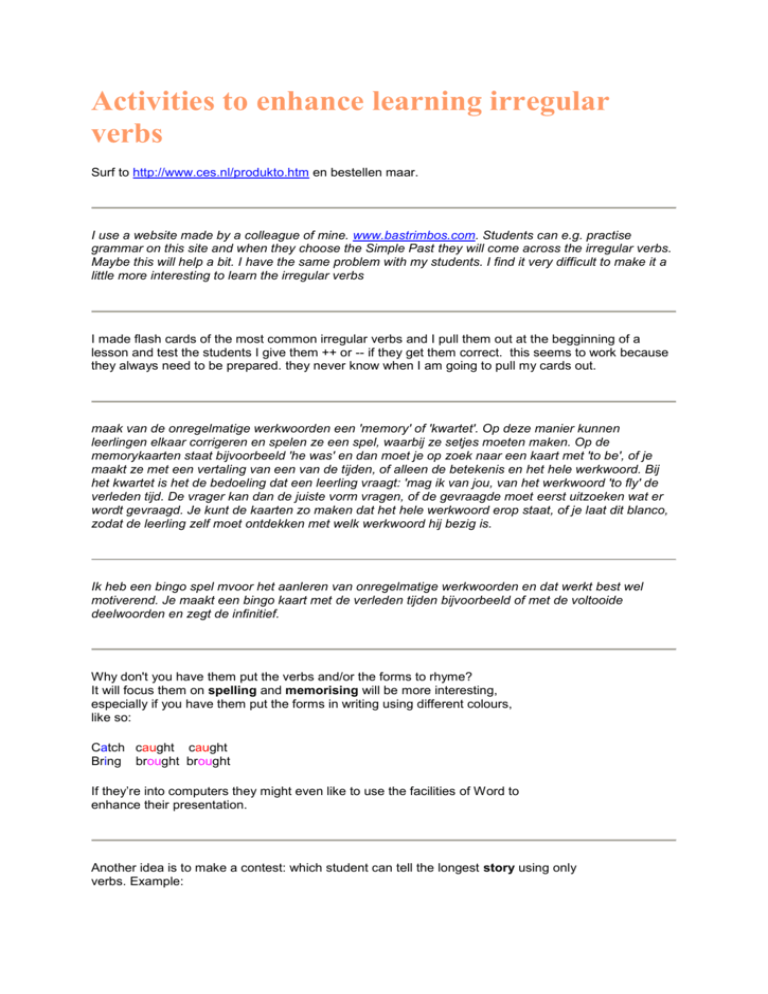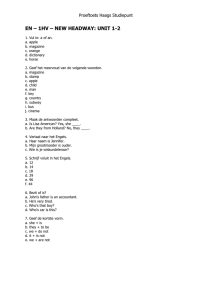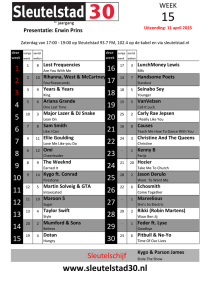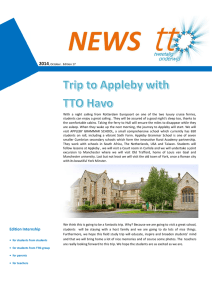Activities to enhance learning irregular verbs
advertisement

Activities to enhance learning irregular
verbs
Surf to http://www.ces.nl/produkto.htm en bestellen maar.
I use a website made by a colleague of mine. www.bastrimbos.com. Students can e.g. practise
grammar on this site and when they choose the Simple Past they will come across the irregular verbs.
Maybe this will help a bit. I have the same problem with my students. I find it very difficult to make it a
little more interesting to learn the irregular verbs
I made flash cards of the most common irregular verbs and I pull them out at the begginning of a
lesson and test the students I give them ++ or -- if they get them correct. this seems to work because
they always need to be prepared. they never know when I am going to pull my cards out.
maak van de onregelmatige werkwoorden een 'memory' of 'kwartet'. Op deze manier kunnen
leerlingen elkaar corrigeren en spelen ze een spel, waarbij ze setjes moeten maken. Op de
memorykaarten staat bijvoorbeeld 'he was' en dan moet je op zoek naar een kaart met 'to be', of je
maakt ze met een vertaling van een van de tijden, of alleen de betekenis en het hele werkwoord. Bij
het kwartet is het de bedoeling dat een leerling vraagt: 'mag ik van jou, van het werkwoord 'to fly' de
verleden tijd. De vrager kan dan de juiste vorm vragen, of de gevraagde moet eerst uitzoeken wat er
wordt gevraagd. Je kunt de kaarten zo maken dat het hele werkwoord erop staat, of je laat dit blanco,
zodat de leerling zelf moet ontdekken met welk werkwoord hij bezig is.
Ik heb een bingo spel mvoor het aanleren van onregelmatige werkwoorden en dat werkt best wel
motiverend. Je maakt een bingo kaart met de verleden tijden bijvoorbeeld of met de voltooide
deelwoorden en zegt de infinitief.
Why don't you have them put the verbs and/or the forms to rhyme?
It will focus them on spelling and memorising will be more interesting,
especially if you have them put the forms in writing using different colours,
like so:
Catch caught caught
Bring brought brought
If they’re into computers they might even like to use the facilities of Word to
enhance their presentation.
Another idea is to make a contest: which student can tell the longest story using only
verbs. Example:
Wake
woke
woken,
Get (up) got (up) got (up)
Eat
ate
eaten
You can vary by having them use only the present (wake – get (up) - eat) or past tense.
If you like you can ask them to include the translation so they get the feel of the meaning
of the various forms (woken – got up – eaten = wakker geworden – opgestaan – gegeten)
There is, of course, software you could recommend (Visiria, Call, OWG).
I work with low-educated adults (ages 18 - 70).
I use two playful ways to practise the irregular verbs:
1.
It would be easier to show you, but I'll try to explain.
You need a deck of cards for every group of 4-5 students.
Teach the game first.
Most students like to learn the names of the symbols: hearts, diamonds,
spades, clubs, and the words you need to play a game like shuffle, deal,
it's your turn, etc.
Every student gets 7 cards.
Put the pile in the middle. Open the top card.
You have to put a card on top with the same symbol or the same picture (number).
If you don't have a card that fits, take one from the pile.
Make them play this till they understand. Tell them to say the name of the card when they throw it:
Queen of hearts, 6 of diamonds.
The Joker fits everywhere and can change the symbol.
Then, shuffle and deal the cards again.
The first student throws a card and says a present tense eg. buy.
If you know the past, throw another card and say: bought.
So the quickest student can throw a card!
Then the next is of course : have bought.
Then the second student throws a card and says another present tense.
etc.
The student who got rid of all his/her cards is the winner.
You can also mix regular and irregular verbs.
You can also make new rules to make it easier or more difficult
This cardgame you can also play with opposites: cold - hot, etc.
or with numbers : 1 - first, 20 - twentieth, etc.
2.
A kinestetic way to learn the irregular verbs is:
Everyone sits in its own place.
When you say the present you clap your hands
When you say the past you knock on the table.
When you say the present perfect you stand up (arms in the air if your students like this sort of things)
BUT
If the past is the same as the present, eg. cut - cut, you clap your hands for the past as well.
So to cut - cut - have cut
is
So to buy - bought
- have bought is
So to sing - sang
- have sung
is
clap - clap - clap
clap - knock - knock
clap - knock - stand up
Practise this together with your students.
If they're good at it, speed it up.
Then make small groups do it together.
A difficult one like: can - could - been able, they will never forget when you jump up at 'been able'' and
wave your hands in the air.
I hope these ideas work for you as well as they do for me.
Ik ben remedial teacher en vanuit mijn werk misschien een tip voor jou.
Ik maak categorieën en laat leerlingen de werkwoorden daar bij zoeken.
Wat voorbeelden:
Drie dezelfde
- to cost-cost-cost
- to let let let enz.
Twee dezelfde met ought/aught
- to bring-brought-brougt
- to teach-taught-taught enz.
" "
met aid
- to pay-paid-paid
- to say-said-said
Zo kun je zelf wel categorieën bedenken. Leerlingen kunnen de woorden erbij zoeken. Op deze
manier zijn ze eerst al zoekend met de stof bezig en daarna kunnen ze ook nog gestructureerd leren.
Zorg dat ze de tekst van hun fave liedje van nu kopieren en laat ze daarin de ww onderstrepen.
Daarna bekijken welke tijd dit is (tt/vt/volt dw) en dan de tekst, of een refrein/couplet, herschrijven in
een andere tijd. Ze kunnen natuurlijk ook gewoon van al die ww de 3 vormen alsnog opschrijven,
oefenen ze ook meteen met het vervoegen van de regelmatige ww!
Bij tijd over kun je natuurlijk ook altijd het liedje nog beluisteren met de hele klas (zorg voor genoeg
kopieen). Uit m'n hoofd weet ik zo even snel dat bijv. het liedje "over the moon" van Ilse de Lange veel
ww. bevat. MIsschien heb je die cd toevallig? Of kun je het downloaden?
I have made a portal with links to various sites in English where students can practice their grammar,
vocabulary, reading and listening. The address is www.mijneigenfavorieten.nl/novaengels. I know
there are numerous sites there with excercises for irregular verbs.
Perhaps asking them to make cards of the three forms and shuffling them, and letting them play
games in groups
with each other trying to match will help.
I used to play 'Tennis' with my students.
Groups of three; two players, one referee.
Player one 'serves' the infinitive; player two 'returns' with the past tense.
Player one can then make a perfect 'volley' with the perfect.
Referee can check ('how do you spell 'built'?). Enjoyable for fifteen minutes.
Have students make a site or a powerpoint presentation in which they have to 'explain' the irregular
verbs.
Try www.englishpage.com
You could use websites and interactive exercises! There are some verb conjugators to be found
online!
Visit www.leshoekje.tk . Choose: 'ik ben leerkracht' and choose: 'english'
You will find a page full of interesting sites for english grammar! also for the verbs and tenses!
have students study the irregular verbs. Then play irregular verb volleybal in class.
One person 'sets up'the verb, pointing at a second person, who then has to shout the past tense, and
pass it on to the third person, who has to shout the third .
Explain well beforehand and make teams so there is a competitive edge.
If software presents a good alternative, I would advise you to phone to: Call Educatieve Software Dhr
A.Rietdijk 01858 20876
In my classes I use them for a bingo.
I make a list of all the irregular verbs they had to learn and put one category on paper (the verbs, the
past tense or the perfect). I let the pupils draw a square with 9 squares in it and they can pick 9 verbs
from the ones on the paper. Then I play the bingo by naming one of the categories that isn't on the
paper; they have to combine the two.
It doesn't sound simple, but it really is. Let me explain some more:
e.g the verbs to learn were 'to catch' , 'to buy' and 'to go' (it would be far over three in real of course!!).
Put on a piece of paper: 'bought', 'caught' and 'went'.
When everybode picked the ones he/she wants to use you shout 'to catch'....
etc and they have to look whether they have the form that belongs to this
('caugth'). The first one to have BINGO gains eternal fame (or sweets etc.)
Ik laat ze wel de vormen "stampen" maar daarnaast ook direct toepassen.
Heb de derde klas laatst in tweetallen een sprookje laten opschrijven (mogen ze ook zelf bedenken) in
tweetallen waarin minstens 20 verleden tijdswoorden in voorkwamen. Ze mochten de lijst erbij
gebruiken.
Ook heb ik een hip interview van internet geplukt en alle werkwoordsvormen onderstreept. De lln
moesten die stukjes vertalen.
Tot slot kun je klassikaal een verhaal maken over wat iedereen precies deed op een bepaald tijdstip
afgelopen weekend (at 10 oçlock Wendy stood up, Rick ate his breakfast and Diana packed her bag
etc. Zo zien ze meteen hoe balangrijk deze vormen zijn..
My pupils don't like to study. I made a memory game for them.
They can play this game in a group and they have to choose two cards and read them out loud. if they
have two of a kind they have a match. Well I think you know how this game works.
On the cards I wrote the three tenses for example:
to think - thought - thought
and the Dutch translation at the bottom.
In my class they are having fun while playing this game.
Maybe something you could try.
At www.digischool.nl/en you'll find some irr. verbs excercises that might help
have a look at www.bastrimbos.com , he's always quite creative with grammar/writing/reading/listening
stuff.
perhaps you can make exercices out of the verbs so they can hand that in.
I usually make sentences and give them the verb in dutch and they have to find out in which tense the
verb has to be. This way they have to memorize them and use the verbs as well.
Use Teach2000 for memorizing anything and take Zarb for attractive testing
Unfortunately I haven't come across anything nice to study words nor irregular verbs. Usually I speak
Dutch like a baby and tell them how this will come across to English people. Of course, they don't want
to sound childish!!! I try to motivate them this way and I tell them that it is a deeply uninteresting but
necessary chore, like cleaning toilets. You simply need to do it. This is no help I know.
Ik heb van de onregelmatige werkwoorden een kwartetspel gemaakt.
het nederlandse woord - het hele engelse werkwoord - de verleden tijd en de voltooide tijd
Ze moeten de juiste vorm vragen en alleen als die goed is, krijgen ze de kaart.
Mijn leerlingen vinden de onregelmatige werkwoorden nu helemaal geweldig
I always work with three boxes: ?, and . (Former paper tea boxes or mugs will work)
Make little notes. Cut paper into squares - works great.
Write down the English verb. Turn the bit of paper around and write down the translation.
Put all the notes in the ? box.
Take one out of it and look at the Dutch translation. Do you know the verbs and how to spell them?
If you've got it right, put the note in the box.
If you've got it wrong, colour the letters that give you any trouble or that can help you to get it right and
put the note in the box.
Finally, when the ? box is empty, fill it up with all the notes waiting in the box.
Repeat this until every little note ends up in the box.
It takes a little time to make the notes, but at least the students have written it all down. Other
advantages: you learn them mixed up - by the time a test is coming up you can simply repeat them all
- any age can do this / like it - works any time - dyslectic students find it easier to remember when they
study like this - and you don't need anyone to test you on it as you can test yourself.
make Domino and Memory games with words. Or draw silly pictures, make gestures anything that
helps to remember it. Students like that better than just repeating lists. It only takes a little time to
make the notes and write down the words, but students should write them down anyway...


